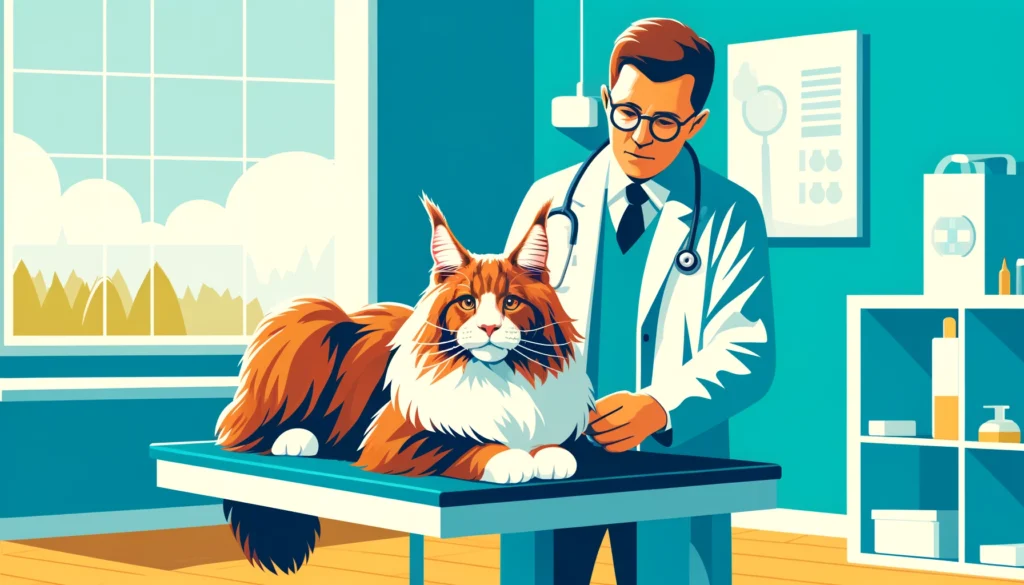
Maine Coon cats, known for their large size and friendly personalities, are a beloved breed among cat enthusiasts. However, like all breeds, they come with their own set of health challenges and veterinary needs. Understanding these issues is crucial for ensuring the well-being and longevity of your feline friend. This comprehensive guide will delve into the various health concerns that Maine Coons face, as well as their specific veterinary requirements.
Maine Coon Health Issues
Maine Coons are generally robust cats, but they are prone to certain health conditions. Recognizing these issues early can make a significant difference in managing them effectively.
Genetic Predispositions in Maine Coons
Genetic health problems are common in purebred cats, and Maine Coons are no exception. These issues often arise from selective breeding practices aimed at preserving specific traits. Some of the most notable genetic conditions include Hypertrophic Cardiomyopathy (HCM), Hip Dysplasia, Spinal Muscular Atrophy (SMA), and Polycystic Kidney Disease (PKD).
Hypertrophic Cardiomyopathy (HCM)
Hypertrophic Cardiomyopathy is a prevalent heart condition in Maine Coons. It involves the thickening of the heart muscle, which can lead to heart failure. Symptoms may include lethargy, rapid breathing, and sudden collapse. Regular veterinary check-ups and echocardiograms are essential for early detection and management of HCM.
Hip Dysplasia in Maine Coons
Hip Dysplasia is a genetic condition that affects the hip joints, causing pain and mobility issues. It can lead to arthritis over time. Symptoms include difficulty in jumping, limping, and reluctance to move. Treatment ranges from weight management and physical therapy to surgical intervention in severe cases.
Spinal Muscular Atrophy (SMA)
SMA is a genetic disorder affecting the spinal cord’s motor neurons, leading to muscle weakness and atrophy. Although it is not painful, it can significantly impact a cat’s quality of life. Genetic testing can help identify carriers and prevent the spread of this condition through breeding.
Polycystic Kidney Disease (PKD)
PKD causes cysts to form in the kidneys, leading to kidney failure over time. Symptoms may include increased thirst, frequent urination, and weight loss. Ultrasound screenings can detect PKD, and management involves dietary adjustments and regular monitoring by a veterinarian.
Obesity and Weight Management
Obesity is a common issue in Maine Coons due to their large size and tendency to overeat. Obesity can exacerbate other health conditions, such as diabetes and arthritis. Therefore, maintaining a balanced diet and encouraging regular exercise are key to preventing obesity.
Dental Health in Maine Coons
Dental problems, including gingivitis and periodontal disease, are prevalent in Maine Coons. Regular dental check-ups and at-home teeth cleaning can prevent these issues. Providing dental-friendly diets and treats can also contribute to better oral health.
Parasites and Maine Coons
Parasites like fleas, ticks, and intestinal worms can affect Maine Coons, leading to discomfort and serious health issues. Regular use of preventive treatments and maintaining a clean environment can help keep these parasites at bay.
Respiratory Issues in Maine Coons
Maine Coons can suffer from respiratory problems, including infections and asthma. Symptoms include coughing, wheezing, and labored breathing. Prompt veterinary care and appropriate medications are necessary to manage these conditions.
Maine Coon Skin and Coat Health
A Maine Coon’s thick, luxurious coat requires regular grooming to prevent matting and skin issues. Skin conditions can arise from allergies, parasites, or infections. Thus, regular grooming and vet check-ups can help maintain healthy skin and fur.
Common Injuries in Maine Coons
Due to their active nature, Maine Coons are prone to injuries. Understanding how to prevent and treat common injuries, such as cuts, sprains, and fractures, is vital for their well-being.
Nutritional Needs of Maine Coons
Maine Coons have specific dietary requirements to support their large size and active lifestyle. A diet rich in protein, vitamins, and minerals is essential for their overall health. Consulting with a veterinarian to create a tailored nutrition plan is recommended.
Vaccinations and Preventative Care
Vaccinations are crucial for protecting Maine Coons from common feline diseases. A regular vaccination schedule, along with preventative care measures like flea and tick treatments, can significantly reduce health risks.
Behavioral Health in Maine Coons
Maine Coons are known for their playful and social nature. Behavioral health issues, such as anxiety and aggression, can arise if their mental and physical needs are not met. Providing a stimulating environment and addressing behavioral problems early can help maintain their well-being.
Senior Maine Coon Health
As Maine Coons age, they may face additional health challenges, including arthritis, kidney disease, and cognitive decline. Senior-specific health care, including regular vet visits and age-appropriate diets, is essential for maintaining their quality of life.
Signs of Health Issues in Maine Coons
Early detection of health problems can make a significant difference in treatment outcomes. Owners should be aware of signs such as changes in appetite, weight, behavior, and litter box habits. Regular health check-ups can help catch issues early.
Choosing a Veterinarian for Your Maine Coon
Selecting the right veterinarian is crucial for your Maine Coon’s health. Look for a vet with experience in treating Maine Coons and a good reputation in the community. Regular vet visits and a strong vet-client relationship are key components of your cat’s health care.
Routine Health Checks for Maine Coons
Routine health checks are vital for early detection of potential health issues. These checks should include physical exams, blood tests, and other diagnostic procedures as recommended by your vet.
Emergency Veterinary Care
Knowing the signs of a medical emergency and having access to emergency veterinary care can be life-saving. Symptoms such as severe breathing difficulties, sudden collapse, or uncontrollable bleeding require immediate attention.
Home Care Tips for Maine Coon Health
Maintaining your Maine Coon’s health at home involves regular grooming, a balanced diet, and a safe, stimulating environment. Home remedies and preventive care can also play a significant role in keeping your cat healthy.
Mental Stimulation and Exercise
Mental stimulation and physical exercise are crucial for a Maine Coon’s overall health. Interactive toys, climbing trees, and playtime can help keep them mentally and physically fit.
FAQs About Maine Coon Health and Veterinary Needs
What are the most common health issues in Maine Coons?
Maine Coons commonly face genetic disorders such as HCM, hip dysplasia, SMA, and PKD. Regular vet visits and genetic testing can help manage these conditions.
How often should I take my Maine Coon to the vet?
It’s recommended to take your Maine Coon for a veterinary check-up at least once a year. Senior cats and those with health issues may need more frequent visits.
What should I feed my Maine Coon?
A diet high in protein and low in carbohydrates is ideal. Consult your vet for a diet plan tailored to your cat’s specific needs.
How can I prevent obesity in my Maine Coon?
Maintaining a balanced diet, providing regular exercise, and avoiding overfeeding can help prevent obesity.
Are Maine Coons prone to dental problems?
Yes, dental issues are common in Maine Coons. Regular dental check-ups and at-home teeth cleaning can help prevent these problems.
What vaccinations does my Maine Coon need?
Your vet will recommend a vaccination schedule based on your cat’s age, health, and lifestyle. Common vaccines include those for feline distemper, calicivirus, and rabies.
Understanding the health issues and veterinary needs of Maine Coons is essential for their well-being. By staying informed about genetic predispositions, common health problems, and preventative care, you can ensure a healthy and happy life for your Maine Coon. Regular vet visits, a balanced diet, and a loving environment are key components of their care. With the right knowledge and attention, you can help your Maine Coon thrive.
Sources:
